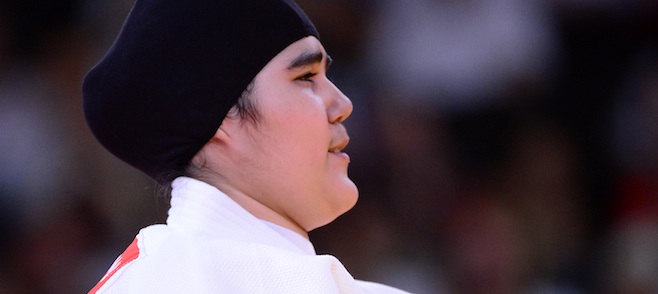82 seconds and a moment of truth for accidental trailblazer from Saudi Arabia
Wojdan Shaherkani lasts a little more than a minute in debut of Saudi women at Games. Can we really call it a milestone?
Saudi Arabia’s Wojdan Shaherkani looks on after losing her women’s +78kg judo contest first round match of the London 2012 Olympic Games on August 3, 2012 at the ExCel arena in London. AFP PHOTO / EMMANUEL DUNAND (Photo credit should read EMMANUEL DUNAND/AFP/GettyImages)
Share
 The atmosphere at a judo match—even an Olympic one—is akin to that of a common prize fight. The audience roars as the action builds. There are random shouts during lulls, when the judokas circle each other like hungry wolves. The sport’s strict traditions keep a veneer of civility. But civility is not what the punters pay to see.
The atmosphere at a judo match—even an Olympic one—is akin to that of a common prize fight. The audience roars as the action builds. There are random shouts during lulls, when the judokas circle each other like hungry wolves. The sport’s strict traditions keep a veneer of civility. But civility is not what the punters pay to see.
It was not the optimal setting, in short, for Saudi Arabia to debut its first female Olympian. It was certainly no place to send an awkward 16-year-old with no more hope of winning than Britain had of staging a rain-free Games.
So all credit to Wojdan Shaherkani: she lasted 82 seconds before Puerto Rico’s Melissa Mojica flipped her to the mat. And that’s about 60 seconds more than smart money would have wagered.
She also managed to smile—heaven knows how.
So the symbolism portion of your Olympic program is complete. The Saudis have embraced Olympic values, circa 1900, and the IOC can proclaim that it no longer brooks antediluvianism (though it brooked it whole lot longer than it did racism when South Africa was telling black people they couldn’t vote).
So what did that minute and 22 seconds represent? You could say, as many have, that the scene alone would change attitudes back in the kingdom (a woman! amid all those roaring men! fighting!). Yet there she was, “suitably dressed” with the “male accompaniment” of her older brother, Hassan Ali Seraj—as if a 80kg judoka needs someone to guard her honour. And let’s be frank: Shaherhkani was a token in the strictest sense of the word, a mere blue belt in judo who required a special exemption from the IOC because she didn’t come within a mile of qualifying.
Others will argue she struck a blow for religious freedom, by winning the right to wear a hijab-like cap in competition. But the brief contretemps proved a sideshow, as the IOC leaned on international judo officials, common sense prevailed. Mojica, the 24th ranked athlete in 78kg judo said it best: “There was no problem with the head covering. Everyone in the world has their beliefs and they should have the opportunity to compete. This is good for judo.”
The match itself was not. Shaherkani flashed a defiant smile after touching hands with her opponent. But she was out of her depth from the first grapple with the world’s 24th ranked judoka in the plus-78kg category. The teenager’s legs wobbled and her apparently strong upper body simply couldn’t keep pace with Mojica’s viciously fast holds and spins.
Afterward, Shaherkani passed through a media mixed zone, where an astounding 200 journalists had gathered, straining barriers lest she share some thoughts. Local organizers had supplied a translator. Alas, it was thought best that a man speak on her behalf.
“She’s excited, she’s very proud and we’re proud of her,” said Hari Kamal Najm, president of the Saudi Judo Federation. “I think it’s a milestone we’ve achieved. I’m so proud and delighted she’s been able to make it. Unfortunately, she was not able to come out of it medal.”
A medal. Right.
There was, however, a moment of truth in this strange act. It occurred as Shaherkani emerged from the tunnel just before the match and waited beside a floor usher for her name to be called . She was plainly nervous, and the female usher—one of numberless volunteers who are making London’s Games a success—reached out and touched the teenager’s hand, giving this accidental trailblazer some badly needed reassurance.
She is, after all, just a girl.